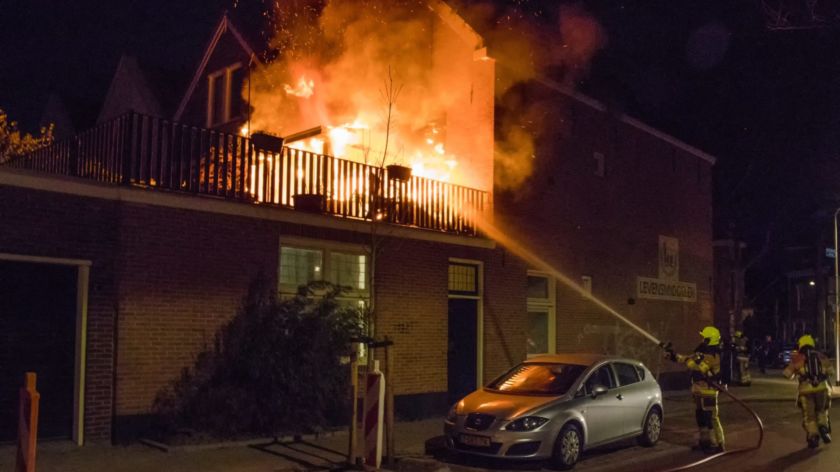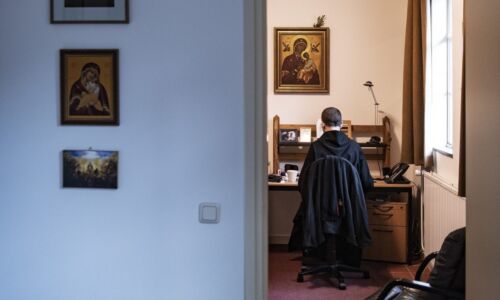‘Students are still not taking fire hazards seriously enough’
-
 In 2019, a huge fire raged in a student flat on the Groesbeeksedwardsweg. Photo by Tom Hessels
In 2019, a huge fire raged in a student flat on the Groesbeeksedwardsweg. Photo by Tom Hessels
Students are still not properly aware of the fire hazards in student housing, so concludes firefighter Wiljan Gerritzen. An appeal sent out by the fire department over the Christmas period failed to improve matters. Landlords are getting desperate. ‘You’re mad if you don’t take fire safety seriously.’
Students often still cut corners when it comes to fire safety. This was determined by firefighter Wiljan Gerritzen, based on visits to various student houses in Nijmegen and the surrounding area. He has been tasked with the fire prevention portfolio on behalf of the Gelderland-Zuid Safety Region.
There are two important questions when it comes to checking student houses, according to Gerritzen. ‘First: Is the building structurally sound and does it adhere to the basic standards when it comes to fire safety? Second: How do the tenants take care of the building? In other words: does their behaviour lead to fire hazards?’

Particularly that last question is where things often go wrong. ‘In the majority of the houses we’ve visited, the landlord made sure everything was in tip-top shape, but we can see that students are less conscientious about the rules. Think of, for instance, outlets that are completely overburdened with plugs, or smoke detectors that were removed during cooking or having a smoke.’
Repeating a thousand times
Gerritzen considers this to be irresponsible. Over the Christmas holiday, the fire department sent out to take additional care with candles and Christmas lights. ‘This is incredibly frustrating to landlords. They can repeat something a thousand times, but in the end, nothing changes if the penny doesn’t drop. Students often don’t consider the potential consequences. But believe me: if a fire breaks out, it can turn into a harrowing situation if the smoke detector is disconnected.’
‘It can turn into a harrowing situation if the smoke detector is disconnected.’
In order to prevent precisely those situations from occurring, Eev Willems, who is herself a landlord of student housing, founded the KKVV back in 2014. This is a foundation that aims to promote ‘proper landlordship.’ Clear communication, happy living and (social) security are key terms for the organisation. Roughly a hundred landlords have joined the organisation over the years. The KKVV foundation now manages around 4500 living spaces, including about 1000 rooms and 500 apartments in Nijmegen.
Fire safety is high on the list of priorities, Willems says. ‘There was a lethal blaze in a student house in Leeuwarden in 2013. After the fact it turned out that there were . That left a deep impact on me. I thought to myself ‘I never want to go through that’. Not for me and especially not for my tenants.’
Check-ups
This is why the foundation performs regular fire safety check-ups in the places they oversee. This is done using a two-stage check-up: First, the caretaker (or concierge, ed.) checks the communal spaces for things like smoke detectors, fire extinguishers, open escape routes and the maintenance of the stove and the dryer. Then students do the same.
‘If it turns out that something needs to be replaced, we do so as soon as possible’ according to Willems. ‘It is the responsibility of the landlord that everything is safe. If something is wrong when it comes to the use of the space, we talk to the students about it.
‘I have on occasion snapped at students’
Those talks sometimes require a stern tone. ‘I have on occasion snapped at students if they repeatedly failed to take fire safety seriously’, Willems says guiltily. ‘But you’re mad if you try to negotiate on matters of fire safety.’ A landlord can’t do much more than pushing for awareness and asking the other tenants to pressure one of them who doesn’t take security seriously.
Awareness
Gerritzen: ‘Adhering to the house rules is the most important. Make sure to explain those clearly to the students and put them up on a notice board in the hallway, for instance. Make the tenants aware of the fact that they’re not just putting their own safety at risk, but that of their housemates as well. You wouldn’t want someone else’s getting injured on your conscience, would you? If students don’t follow the rules, you can give them a warning, or in extreme cases where fire safety is in jeopardy, you can take legal steps.’



